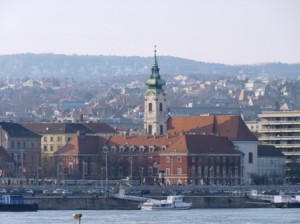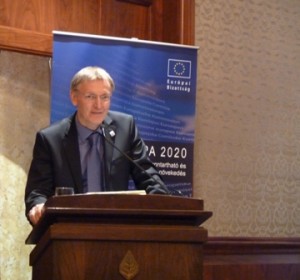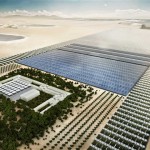Search Results for Tag: water
Learning to save water in Madagascar
The efficient use of the rare water resources in Madagascar is a huge problem. A water-management program, set up by the WWF is not only serving to protect forests, but also helps locals use their water resources sustainably, and therefore improve their farming opportunities. 35,000 people are living on the Mahafaly Plateau, one of the driest corners of Madagascar, and climate change poses a serious threat to people’s livelihoods.
Old wall, new energy – hydropower in Honduras
In the Honduran city of La Esperanza, an old dam has been refitted to produce green energy. Designed with climate protection in mind from the start, the facility was the first project worldwide that was allowed to sell carbon emission certificates after the 1997 Kyoto treaty. The re-build power supply has created 70 new jobs and it provides electricity to surrounding villages. 30,000 tons of CO2 are reduced annuall.
South Sudan’s Hope

After winning independence over the weekend, The Republic of South Sudan is the world’s newest country. Even though the nation is just starting out, it’s rich in natural resources and has huge potential to grow and prosper – especially when it comes to clean energy.
One of the World Bank’s chief technicians, Daniel Kammen, took a video of South Sudan’s Fula Rapids while he was on site recently. The force and power of the White Nile River’s rapids make them the perfect source for hydropower. Some experts believe the Fula Rapids alone could produce 60 megawatts of electricity – and that in a country that generates less than 200 megawatts total right now.
Because South Sudan is largely undeveloped, officials there have the chance to start from the very beginning with renewable energy generation and green-friendly development practices. But one big question remains: will renewable energy projects benefit the country’s poor, too? Or will its new-found natural wealth end up in the hands of the few?
On the banks of the blue Danube
 I took a good look at the river Danube in the centre of Budapest in my lunch-break today and in the sunshine on a pleasantly warm spring day, I could just about imagine it was blue like in the famous Strauss waltz. But like most major rivers these days, it is more brown than blue. And the sound all around is of traffic rather than music. The river is wide, flanked by beautiful historic buildings and host to a fleet of tourist boats.
I took a good look at the river Danube in the centre of Budapest in my lunch-break today and in the sunshine on a pleasantly warm spring day, I could just about imagine it was blue like in the famous Strauss waltz. But like most major rivers these days, it is more brown than blue. And the sound all around is of traffic rather than music. The river is wide, flanked by beautiful historic buildings and host to a fleet of tourist boats.
What an apt place for a conference on the “Future of European Waters”. It’s taking place within the framework of the Hungarian Presidency of the EU and I’m here with a group of journalists from different member countries on the invitation of the European Journalism Centre. Water is an “in” topic at the moment. At a high-level meeting here this weekend, the EU Environment Commissioner Janez Potocnik is presenting a “blueprint” for the future of water in the Community.
 Ultimately it’s all about how we treat water as a resource. The Commissioner and the scientists and experts speaking at the conference stress that water as a key resource can never be considered in isolation. We need it to drink, wash, grow crops, for industry, transport, to provide power and, as the disaster in Japan keeps reminding us, to cool nuclear reactors. So all different sectors have to be involved in making sure we have a secure water supply in the future, and that means quality as well as quantity. Demands on water, which is a scarce resource in many places, are rising all the time. And a river like the Danube flows through several different countries, so protecting it cannot just be a national issue. That’s when it becomes clear that Europe has an essential role to play.
Ultimately it’s all about how we treat water as a resource. The Commissioner and the scientists and experts speaking at the conference stress that water as a key resource can never be considered in isolation. We need it to drink, wash, grow crops, for industry, transport, to provide power and, as the disaster in Japan keeps reminding us, to cool nuclear reactors. So all different sectors have to be involved in making sure we have a secure water supply in the future, and that means quality as well as quantity. Demands on water, which is a scarce resource in many places, are rising all the time. And a river like the Danube flows through several different countries, so protecting it cannot just be a national issue. That’s when it becomes clear that Europe has an essential role to play.
Jacqueline McGlade is the Executive Director of the European Environment Agency. She told me here that water had to be the next big topic on the European Agenda, following on from energy and climate change. She mentioned the worrying increase in floods and droughts in Europe. All the climate experts tell us we have to prepare for more extreme weather events. Managing our water resources in a changing climate is becoming an existential issue. When it comes to what it means in practice, the buzzwords seem to be efficiency, technology and recycling. A country like Singapore has developed an effective and complex system to recycle and re-use its water.
The other key issue is coordination and involving all the necessary parties who have a need for or an impact on our water. It makes sense that protecting water is only possible by involving agriculture and industry both as users of water and sources of water pollution, and every sector that needs water. Europe’s water infrastructure – from drinking water to sewage processing – is getting old, a lot of needs to be replaced with more modern technology – but that’s a costly business. Plenty of things to talk about – and, we hope, act upon – for the politicians and experts here on the “blue Danube” this weekend.
Jordan’s Green Machine
Jordan's government has approved a revolutionary new green project that could transform the country's desert into a green oasis and provide basic necessities like food and water to boot. An environmental technology group called the 'Sahara Forest Project' is creating a massive facility in the desert city of Aqba that promises to turn transform sun and seawater into food, energy and clean drinking water.
And to top it all off, the facility could combat climate change too by pulling in large amounts of carbon dioxide from the atmosphere. An MSN article on the project describes more of the details, including how the solar power plant and the greenhouse system will work.
The facility in Aqba will actually be a demo plant so developers can see how it works before creating more. And it could be up and running as early as 2012. Is this the way of the future for desert landscapes? Would this kind of project work in your country?















Feedback